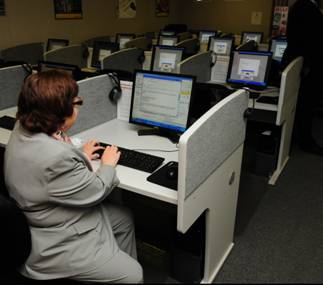Wednesday, May 18, 2011
By LIZ HOLLAND
Daily Times staff writer
PRINCESS ANNE – (May 17, 2011) — UMES students and members of the public can now learn to speak Arabic, Chinese and Haitian Creole at a new center designed to expand the university’s mission of internationalization.
Since the Sept. 11 attacks, the U.S. government has stressed the importance of learning foreign languages, particularly ones that are less commonly taught, said Dr. Emmanuel Acquah, executive director of International Development Programs at UMES.
“There’s a need to train more Americans,” he said. “It’s critical to homeland security.”
The 20-seat classroom so far has offered a one-day Spanish class for health care providers including staff at the Somerset County Health Department, said Tammy Gharbi, acting program coordinator for the new Foreign Language Instructional Center.
Nuns from Seton Center in Princess Anne, who frequently visit Haiti and work with a mission there, took lessons in Haitian Creole.
Acquah said he also hopes to develop summer programs for high school students.
The bulk of the classes, though, will be offered to UMES students, who previously could take only Spanish and French classes on campus.
In addition to the new Arabic, Chinese and Haitian Creole classes, the center plans to add Hindi, Russian, Swahili and several African languages such as Dinka and Yoruba, Gharbi said.
Students who learn foreign languages will have an advantage over those who don’t when it comes to finding a job.

“This just opens up the world to them,” Gharbi said.
The U.S. State Department, as well as private employers, are looking for people who can speak Arabic and Chinese.
“The demand is huge,” she said. “They cannot get people fast enough.”
Ejovwoke “E.J.” Esiobise, an accounting major from Nigeria who works at the center, started studying Haitian Creole after meeting the instructor.
“I was just interested, and I hope to learn more (languages), too,” he said.
In addition to using native speakers as teachers, the center is equipped with the Sony Virtuoso digital language learning system as well as software such as Rosetta Stone, all funded through the U.S. Department of Education Title III program.
“It’s something not available anywhere else in the region,” Gharbi said.
This article originally appeared in the May 17, 2011 edition of The (Salisbury, MD) Daily

